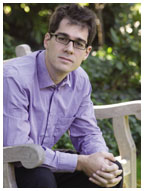Photo by Frank Wojciechowski |
Joel Stein
Joel Stein, a columnist for Time magazine and regular performer on the hit VH1 series, I Love the ’70s and I Love the ’80s, is teaching a seminar this fall on humor writing — a course listed in the Daily Princetonian as part of the “ideal fall schedule.” He recently spoke with PAW’s Mark F. Bernstein ’83.
You went to Stanford. Is it true that your parents only allowed you to apply there if you didn’t get into Princeton?
Yes. I wasn’t allowed to apply anywhere that wasn’t within driving distance. I made a huge presentation to my parents about why I should be allowed to apply to Stanford and they said, “OK, if you don’t get in to Harvard, Yale, or Princeton, you can go.” Then they saw my application to Stanford, which was idiotic. And they said, “You can’t send this in ... wait — yes, yes! Send your Top 10 list to Stanford!” But Princeton was where I really wanted to go.
Did you send your Top 10 list to Princeton?
No, my Princeton application was much more serious. It’s a hard school to get into, and I didn’t get in. So now I’m taking it out on the students.
Is this the first course you’ve ever taught?
Let’s see. When I was 17, I taught a course on cooking at the Jewish Community Center, so I’m drawing mostly on that experience.
Students had to apply for a spot in your class. Were you looking for people who are funny or people you could mold into being funny?
I decided it was going to be a writing class, and that humor was simply the flavor. So I wasn’t going to choose students on how funny they were, I was just going to choose them on how good their writing is. There are certainly people I rejected who are much funnier than people I accepted. I thought I took half men and half women, but there’s a woman in my class named Sean, so I have an extra woman instead of a guy. It’s my fault. Her application involved her love of Jane Austen, so I obviously wasn’t paying attention. I could have figured it out.
There’s an old saying that dissecting a joke is like dissecting a frog: You can do it, but it tends to kill the frog. So, how do you teach humor?
Sure, after you dissect a joke it probably is less funny, but we don’t care. We want to dissect the joke. Humor is just logic. These are smart kids. Once you figure out the logic of humor, how to build an analogy, how to riddle out the logic of oppositions, it’s just a matter of learning how to think that way. I try to get people to the point where, if you are a reporter somewhere and you’re with President Bush and he barfs all over the Japanese prime minister, you don’t just write that story straight. You’re not doing your job if you write that straight.
Can anyone learn to be funny?
I don’t think I could have made Jonathan Edwards funny. He’s not funny. He’s dead. A lot of problems there. One course isn’t going to change someone’s personality. But I think people can learn how to appreciate humor by reading a bunch of it, and learn how to do it if necessary.
Is there a difference between written humor and spoken humor?
They’re really different because, in written humor, the performance aspect is gone. Some people write really funny stuff, but when they read it, it’s not funny. They’re not performers. My stuff sucks when I read it.
Do you have your students do a lot of writing?
It’s a lot more work than they think they’re doing, because they’re enjoying it. But it’s a lot of writing — a 750-word piece and a 750-word rewrite every week. That’s more writing than anyone I work with. You’d be a good Time employee if you did that much writing.
Who’s funnier: Princeton students or Stanford students?
God, they’re both horribly unfunny. Princeton students are funnier. The West Coast is easily shockable. You take your East Coast attitude to the West Coast and you already have a step up. Princeton students are stuck in the humor of the 1920s, like this whole place is stuck in the 1920s.
Doesn’t 1920s humor involve seltzer bottles and that sort of thing?
OK, well, not Jewish 1920s humor. I think James Thurber strikes a chord here, though I know he’s more from the 1930s. F. Scott Fitzgerald [’17] really left a mark here.
Did you know that Fitzgerald’s old dorm room still has a plaque on the mantel?
Instructing everyone how to act? (In a deep Fitzgerald voice) “Drink
heavily!” ![]()


